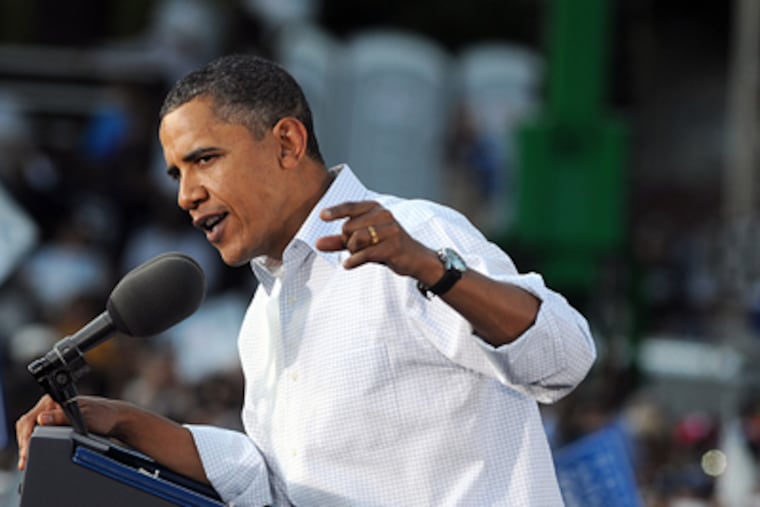Inquirer Editorial: Follow the money
President Obama acted irresponsibly at Democratic rallies, including one Sunday in Germantown, when he warned about foreign bogeymen buying U.S. elections.

President Obama acted irresponsibly at Democratic rallies, including one Sunday in Germantown, when he warned about foreign bogeymen buying U.S. elections.
"Groups that receive foreign money are spending huge sums to influence American elections, and they won't tell you where the money for their ads comes from," Obama said.
The White House has no proof that foreign money is playing any role in this election, and presidential adviser David Axelrod admitted as much. But that hasn't stopped top Democrats from fearmongering as a last resort leading up to Election Day.
Obama and other Democrats are targeting especially the U.S. Chamber of Commerce, which collects dues from foreign members and expects to spend about $50 million on campaign ads against Democratic candidates. But the chamber receives only a total of about $100,000 per year from 115 foreign affiliates, out of an annual budget of $200 million.
And the chamber keeps its foreign dues in a separate account. Liberal organizations such as the Sierra Club do the same thing while lobbying in Washington.
The problem isn't a trickle of secret foreign money manipulating U.S. elections. The problem is vast sums of clandestine domestic cash that is influencing voters.
The U.S. Chamber is near the top of the list of offenders. Thanks to court rulings and permissive tax laws, such trade associations can spend millions on campaign advertising for or against a specific candidate without having to disclose their donors.
Other advocacy groups have sprung up this year like mushrooms after a spring rain to take advantage of this regulatory vacuum. One Republican-leaning group, American Crossroads GPS, has invested heavily in ads in the U.S. Senate race in Pennsylvania to defeat Rep. Joe Sestak, the Democratic candidate.
These independent, third-party groups can inject themselves into a race with or without the tacit approval of the candidate who benefits from their involvement.
A Supreme Court ruling earlier this year allows these interest groups to take unlimited amounts of corporate cash, or union money, and spend it on election advertising without revealing who gave what. It could be the insurance industry, or big oil companies. There's no way of knowing.
Voters have a right to know who's behind campaign ads, to better assess the motivation and accuracy of the message. Advocacy in free, open democratic elections should not depend on anonymity.
A bill stalled in the Senate, the Disclose Act, would alleviate some of the mystery now shrouding federal elections. It would require groups to reveal who's paying for their campaign ads. The legislation was approved by the House last summer, but Senate Republicans have blocked it.
It's too late to clear up this growing problem in the midterm elections. But Congress must address the growing secrecy invading federal elections before the 2012 presidential race.